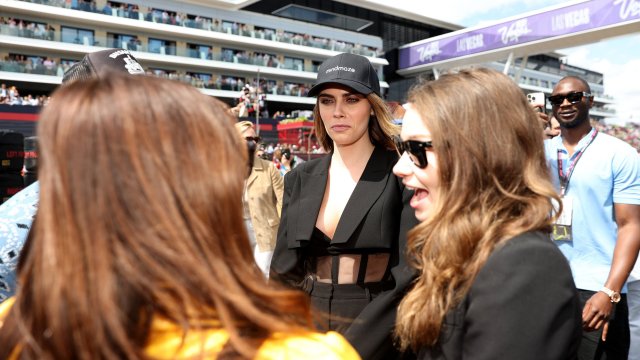
Wasn’t Silverstone exciting this year? I mean, fine, there was the car-racing, but the real highlights were off the circuit.
I watched with a powerful combination of awe, horror and perverse thrill as Damian Lewis assassinated the national anthem during the F1 British Grand Prix this weekend. What a tribute to the new King. Was it bad enough to be considered treason? Bless Damian, though, for having a go. It takes some guts to be that pretentious in front of a global audience.
Yet somehow model, actor and Silverstone attendee Cara Delevingne managed to be roasted worse than him on social media. What is going on here?
For anyone who hasn’t seen the clip, Delevingne was approached for interview by former racing driver turned Sky Sports commentator Martin Brundle. Before he reached the supermodel, a representative wearing an Alfa Romeo Sauber T-shirt gestured to Brundle that Delevingne should not be interviewed. Brundle pushed on, claiming that all celebrities on the grid must agree to talk.
Delevingne smiled at Brundle and said “no”. She said “no” again, still smiling, and seemed to be trying to listen to the representative when she said: “I can’t hear anything.” Finally, still smiling, she said: “I’m sorry.”
Brundle walked away from Delevingne as she smiled and gave a thumbs-up for the camera. He then quipped: “Well… I’m sure it would have been extremely interesting.” Because of course Delevingne’s a model and must therefore have nothing to say that’s worth hearing. Which begs the question: if she’s so dull, why was Brundle so eager to interview her in the first place?
Social media commentators have gone wild for the clip, calling Delevingne rude and pretentious and hailing Brundle a hero for cutting the star down to size. But was the incident really such a triumphant strike against celebrity vanity?
I think I know exactly what’s going on here. There’s nothing like the public humiliation of a famous woman to really bring out the metaphorical knives on social media.
Brundle’s pre-race grid walks have become something of a tradition, where the pundit often manages to seek out a star apparently unprepared or unwilling for a live interview. The ensuing awkwardness makes for a bit of fun TV for viewers and – hopefully for Sky – a viral video clip for social media. Over the past few years, we’ve seen similar incidents with actors Owen Wilson and Brad Pitt – although the latter did agree to be interviewed by Brundle at Silverstone this year.
At the 2021 Grand Prix in Austin, Brundle was trying to interview Megan Thee Stallion when one of her bodyguards shooed him away, as another said: “You can’t do that.” Brundle then took to Twitter to complain about rude celebrities and their bodyguards.
The encounter resulted in Formula 1 introducing a new procedure for celebrities invited onto the grid. Referred to by Brundle as the, er, “Brundle Clause“, F1 no longer allows stars to be accompanied by a security entourage – something raised by many on social media in response to the Delevingne incident.
But the model didn’t have a bodyguard. Delevingne later stated on Twitter that the person who initially refused the interview on her behalf was an F1 representative.
When I was sent the clip by a friend, I expected to scoff at the belligerence of yet another entitled Hollywood actor. Instead, I was left feeling distinctly uncomfortable and made more so by Delevingne’s treatment on social media. Her repeated, clear “no”, tempered by smiles and apologies, and the resulting ridicule by a persistent but rejected man, felt too familiar to me to be amusing. I was led to believe by social media that she was rude to Brundle, but on seeing the clip for myself, she seems polite in her refusal. What did she really do wrong? Formula 1 clarified back in 2021 at the introduction of the Brundle clause that it did not compel celebrities to be interviewed.
Despite the widespread social media celebration of Brundle and denunciation of Delevingne, I can’t help but see their encounter as a mirror of attitudes to women’s refusals. We might say “no” clearly and repeatedly. We might smile to try to take the sting out of it, knowing that men, especially persistent men, might take a refusal badly. We might even apologise for our “no” and look to others to back us up, to help to give our refusal some weight – because it’s too easily brushed away on its own. After all that, we might still be called rude. Haughty. Big-headed. We might be ridiculed for the refusal. Diminished. Publicly humiliated.
I can’t laugh at Brundle’s attempt to interview Delevingne, I’m afraid. Watching it and then reading the responses online makes me realise that women’s “noes” still count for nothing and the dismissal of them is still viewed as comedy. If someone as rich, well known and with as much clout as Delevingne can’t have a “no” accepted, then what hope is there for the rest of us?


